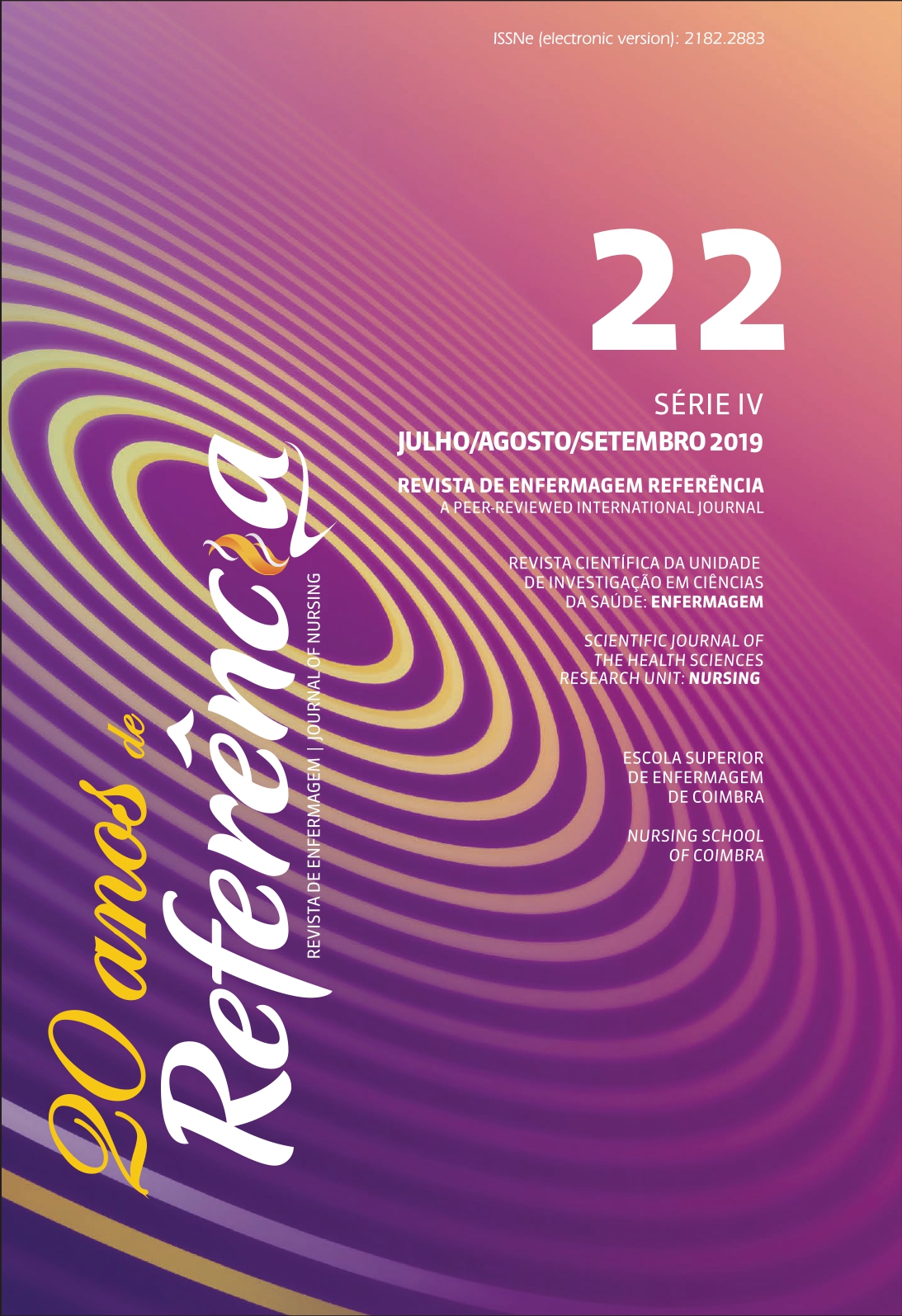Effectiveness of an empowerment-based educational program in self-efficacy perception in patients with diabetes
DOI:
https://doi.org/10.12707/RIV19037Keywords:
self efficacy, diabetes mellitus, type 2, health education, empowerment for health, nursing, educational programAbstract
Background: Studies suggest that empowerment-based educational models, implemented in patients with diabetes, may encourage the improvement of perceived self-efficacy. This variable is considered relevant in the therapeutic regimen self-management.
Objectives: To evaluate the effectiveness of an empowerment-based educational program in patients with type 2 diabetes mellitus.
Methodology: A quasi-experimental study, with two different evaluation moments, with a 6-week interval. A randomized sample of 42 participants (experimental group = 19; control group = 23), registered in a family health unit of the ARS of Central Portugal. The Diabetes Empowerment Scale - Short Form (DES-SF) was the instrument chosen to determine the program’s effectiveness. All formal and ethical procedures were assured.
Results: Patients subjected to the empowerment-based educational program presented a higher self-efficacy perception (p = 0.000) than those who followed the regular surveillance protocol.
Conclusion: Empowerment-based educational programs seem to contribute to an improvement in perceived self-efficacy and should, therefore, be used as an educational strategy for patients with type 2 diabetes mellitus.
Downloads
References
All European Academics. (2018). Código europeu de conduta para a integridade da investigação. Recuperado de https://www.allea.org/wp-content/uploads/2018/11/ALLEA-European-Code-of-Conduct-for-Research-Integrity-2017-Digital_PT.pdf
American Diabetes Association. (2017). Standards of medical care in diabetes: 2017. The Journal of clinical and aplied research and education: Diabetes Care, 40(sup.1), 54-55. Recuperado de https://care.diabetesjournals.org/content/diacare/suppl/2016/12/15/40.Supplement_1.DC1/DC_40_S1_final.pdf
Anderson, B., & Funnel, M. (2005). The art of empowerment: Stories and Strategies for Diabetes Educators (2ª nd.). Alexandria, EUA: American Diabetes Association.
Anderson R., Fitzgerald J., Gruppen L., & Funnell,M. (2003). The diabetes empowerment scale-short form. Diabetes Care, 26(5),1641-1642. doi:10.2337/diacare.26.5.1641-a
Associação Protetora dos Diabéticos de Portugal. (2017). ABC da Diabetes. Recuperado de https://apdp.pt/diabetes/abc-da-diabetes/
Aveiro, M., Santiago, L., Pereira, P., & Simões, J. (2015). Estudo de fiabilidade da escala de capacidade de controlo da diabetes: Versão breve. Acta Medica Portuguesa, 28(2), 177-181. Recuperado de https://ubibliorum.ubi.pt/bitstream/10400.6/4860/1/Aveiro%2c%20M.%20et%20al.%202015.%20Estudo%20de%20Fiabilidade%20da%20Escala%20de%20Capacidade%20de%20Controlo%20da%20diabetes.pdf
Bandura, A. (1989). Human agency in social cognitive theory. American Psycologist, 44(9), 1175-1184. Recuperado de https://pdfs.semanticscholar.org/7539/60aef3f2747f757d73bc5c9330a21b484f2e.pdf
Brunton, S., & Polonsky, W. (2017). Medication adherence in type 2 diabetes mellitus: Real-world strategies for addressing a common problem. The Journal of Family Practice, 66(4), 546-549. doi:10.2147/PPA.S106821
Chen, F., Wang, H., Lin C., Hsu, Y., & Chen, W. (2015). Efficacy of an empowerment program for Taiwanese patients with type 2 diabetes: A randomized controlled trial. Applied Nursing Research, 28(4), 366-373. doi:10.1016/j.apnr.2014.12.006
Cortez, D., Macedo, M., Souza, D., Santos, J., Afonso, G., Reis, I. & Torres, H. (2017). Evaluating the effectiveness of an enpowerment program for serlf-care in type 2 diabetes: A cluster randomized trial. BMC Public Health, 17 (41), 1-10. doi:10.1186/s12889-016-3937-5.
Direção-Geral da Saúde. (2017). Programa nacional para a diabetes: 2017. Lisboa, Portugal: Autor. Recuperado de https://www.dgs.pt/portal-da-estatistica-da-saude/diretorio-de-informacao/diretorio-de-informacao/por-serie-894111-pdf.aspx?v=11736b14-73e6-4b34-a8e8-d22502108547
Funnel, M., Tang, T., & Anderson, R. (2007). From DSME to DSMS: Developing empowerment-based diabetes self-management support. Diabetes Spectrum, 20(4), 221-226. doi:10.2337/diaspect.20.4.221
International Diabetes Federation. (2017). Diabetes atlas (8ª ed.). Bruxelas, Belgica: Autor.
Menino, E., Dixe, A., & Louro, M. (2016). Construção e validação da escala de educação terapêutica para o comportamento de autocuidado na diabetes. Revista de Enfermagem Referência, 4(8), 35-44. doi:10.12707/RIV15049
Observatório da Diabetes. (2016). Diabetes: Factos e Números - O Ano de 2015 − Relatório Anual do Observatório Nacional da Diabetes. Lisboa, Portugal: Sociedade Portuguesa de Diabetologia.
Ratner, N., Davis, E., Lhorka, L., Wille S., & Walls, M. (2017). Patient-centered care, diabetes empowerment, and type 2 diabetes medication adherence among american indian patients. Clinical Diabetes, 35(5), 281-285. doi:10.2337/cd17-0008
Regulamento n.º 798/2018 (2018). Diário da República n.º 231/2018 - Série II. Comissão Nacional de Proteção de Dados. Lisboa, Portugal.
Saad, A., Younes, H., Ahmed, H., Brown, A., Alowesie, M., & Hassoun, K. (2017). Self-efficacy, self-care and glycemic control in Saudi Arabian patients with type 2 diabetes mellitus: A cross-sectional survey. Diabetes Research and Clinical Practice, 137, 28-36. doi:10.1016/j.diabres.2017.12.014
Sousa, M. R., Pereira, F., Martins,T., Rua, I., Ribeiro, I., Cerdeira, C., … Santos, C. (2017). Impact of an educational programme in Portuguese people with diabetes. Action Research, 27(2), 1-19. doi:10.1177/1476750317736369






















